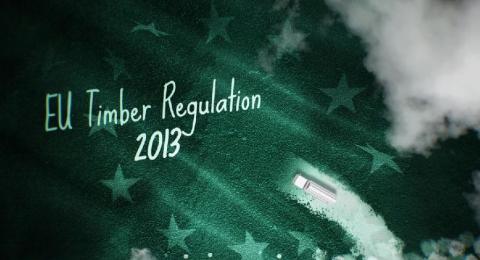Chatham House meeting: EU illlegal timber law requires urgent action
What steps can European companies take to keep up to speed with the new EU timber legislation? And do they have enough time? At Chatham House last week, the European Commission shed some light on the next steps for implementing the EU Illegal timber law.
International efforts to tackle illegal logging have reached an all time high with Europe joining the US in establishing legally binding timber legislations, and may soon be followed by Australia.
At an international event last week organized by the UK think-tank Chatham House, more than 250 industry, NGO and government experts gathered for a bi-annual international event to share their latest thoughts and legislative updates on this global malady.
Next steps in Europe: have your say
European timber companies have roughly two years until the new EU timber regulation will come into effect across all 27 member states. It will require operations that first place timber on the European market, “first placers” to take “due diligence”. But the exact details have yet to be defined, spreading unease among industry.
At Chatham House, the European Commission unveiled its next steps in defining the details for implementing the due diligence system. After a closed consultation with experts from Member States and the European Parliament next month, the Commission will open the forum to the public through two events on 21 and 22 March 2011.
“We encourage companies and other interested parties to take part in this very important consultation so that we can better capture the needs of the industry and make these implementing measures truly effective,” said Svetla Atanasova, Legal Officer for the European Commission.
“A sense of urgency”
What is now clear is that by 3 June 2012, details of the due diligence system – including what is required for risk assessment and risk mitigation - will be finalized. This will give companies less than one year to implement these measures in time for the date imprinted on Europeans industries’ minds: 3 March 2013 when the legislation comes into force.
“There is a sense of urgency. First movers will be winners. They will be the ones that have enough time to change their trading patterns,” explains Christian Sloth, Verification Services Manager at the Rainforest Alliance.
John Lewis: is it really realistic?
Two years from now may sound like a long time, but this poses huge challenges for companies of any size. The retail sector will need to overcome the complexities of having broad ranges of products resulting in multiple supply chains and perhaps even sourcing from numerous smallholders.
“Is it really realistic? It’s a fantastic aspiration but a massive, massive challenge,” said Fiona Wheatley, Responsible Sourcing Manager for leading UK retail group John Lewis. “Companies like John Lewis that are already focused on assessing their supply chains will be better positioned,” she said, and stressed that responsible companies can take the lead which will offer benefits to others.
What Europe can learn from the US
A word of encouragement came from Jameson French, US based Northland Forest Products: “Get on with it, we have!” Unlike Europe, the timber legislation in the US was implemented the day it was adopted. Moreover, it applies to operations throughout the supply chain, not just to “first placers”.
The burning question among participants was: how effective has the Lacey Act been at tackling illegal logging? Speaking on behalf of the Environmental Investigations Agency (EIA), Andrea Johnson drew on several cases of enforcement highlighted by the World Resource Institute.
Agents from the US Fish & Wildlife Service confiscated three pallets of Peruvian tropical hardwood in 2009 that was supported by evidence that the exporter used false documentation. In the same year, agents seized Madagascan rosewood from Gibson Guitars; the investigation on its legality is still pending and no charges have been pressed yet.
While already sourcing FSC-certified material for some of its product lines, the company has since announced its plans to source entirely from legal and FSC timber.
An initial assessment of the impact will become clearer with the results of a two year review. Technological advances for identifying timber fiber species and origins could boost policing efforts. But perhaps the major decider on success in both Europe and the US that speakers identified is whether enough funding is allocated to enforcement.
As in Europe today, the US industry was anxious about the implications to their business prior to adoption of the legislation, but the EIA presented encouraging findings from a survey. On the whole, US companies did not find the process particularly burdensome and held a relatively high awareness of the law. Thousands of declarations have been submitted.
Are we moving the problem elsewhere?
A poignant issue raised is that higher costs for legal or certified timber may lead to changes in consumer preferences towards other building materials such as steel and concrete.
Concerned industry and NGO participants identified the need for similarly stringent rules to be placed on other sectors.
And will all of these efforts be futile if the new illegal timber laws of EU, US and Australia change trading patterns, moving the problem elsewhere? A question for which there is no answer today.
Getting industry into gear
Although the precise details on what is needed to comply with the European legislation are not yet known, companies can start being careful today. NEPCon and the Rainforest Alliance are already working with global industry leaders in furniture, paper and packaging, trading to develop a system in preparation of the implementation date.
The Commission will define the procedures for recognizing monitoring organizations by 3 March 2012. Stakeholders are encouraged to also make their views known on this issue in the stakeholder consultation.
“As a leader in the field of FSC certification and legality verification, NEPCon and the Rainforest Alliance will strive to seek formal recognition as monitoring organizations,” said Mr Sloth. “We look forward to working with companies to demonstrate their conformance with the new EU timber legislation.”



